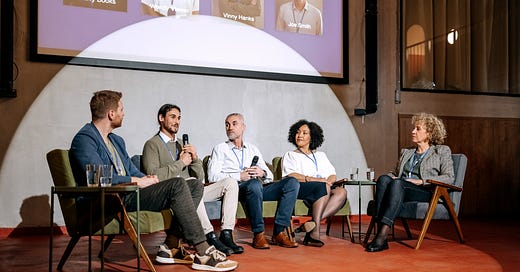How to be a great panelist
Cut the intros, disagree with your fellow panelists, and force 2-3 of your interesting viewpoints into the conversation.
👋 Hi, it’s Greg and Taylor. Welcome to our newsletter on how to make high-stakes professional and personal decisions in your 30s.
Most panels suck. They’re poorly run. They waste 15 minutes on introductions no one wants to hear. Moderators pitch softball questions to panelists who are afraid to disagree with each other.
But if you’re a high performer, you’ll probably be asked to join one in your 30s. And you should say yes: It’s a good opportunity to build your brand, test your ideas, and make connections – if you do it right.
I’ve been on hundreds of panels, and I think it’s actually EASY to stand out if you do a few simple things right. The bar is low – your audience expects to be bored. Say 2-3 controversial, surprising, or genuinely useful things, and they’ll remember you.
Here’s my playbook for how to do it.
– Greg
10 tips to stand out on a panel
1. Attend the pre-call, and lead if you have to. Go to the pre-call even if it seems optional – this is your chance to set some ground rules. If the moderator seems unsure (common), jump in and lead the call. Establish the format and the primary outcomes the panel wants to deliver for the audience.
2. Tell your fellow panelists you want a debate. Establish that you want to have an interesting, even controversial conversation. Say: “I’ll probably disagree with you, so don’t take it personally – I just want to stimulate a lively conversation.”
3. Insist on very short introductions. Long, self-important introductions are a huge waste of time and no one wants to hear them. That’s what LinkedIn is for.
4. Prep by thinking of 2-3 memorable insights. Do some prep work, and think of a few takeaways you want the audience to leave with. Set a high bar for yourself. The goal is for someone to walk out of the panel and remember one thing that was said – and you’re the one who said it. Think of possible audience takeaways in three buckets: a prediction, a lesson, and an insight.
5. Add new insight (not what the other person just said). When other panelists are talking, tune in to what they’re saying and then add your own value. That means building on their insight or often disagreeing – not just reinforcing it and repeating it. Way too many panelists start their spiel with, “To echo what Dave just said…”
6. Share the stage, own the question. When you’re asked a question, own it. Pause, then provide your answer and your thinking. You can reference another answer from one of the other panelists but get to your unique insight within two sentences. And don’t rush – speak slowly and clearly so your audience hears it.
7. Hit your talking points (even if you have to answer your own question). You’ve already decided on your talking points and the value you want to offer, so make sure you deliver those. It’s okay to be a bit of a politician – if you’re asked an irrelevant question, redirect or pose your own question to hit your talking points.
8. Don’t say, “That’s a great question.” It’s boring. Try “a lot of people ask that question, but I think we should be asking this instead.”
9. Be aware of the audience and their experience so far. You’re just one of many panels your audience is likely attending. Can you relate what you are saying to what has been discussed or presented earlier? If the panel is at the end of the day and the audience is tired, then raise your energy level. If you’re speaking to a bunch of CFOs, make sure your facts and data are good. You get the point.
10. Get the obvious stuff right. Make sure you have water. Make sure your mic works before you get on stage. Put your phone on silent. And make lots of eye contact with the whole audience – not just the front row.
Our advice
If someone comes up to you afterwards and says, “I really like what you said about … [specific insight],” that’s a win.
If not, keep working on it. Hone your talking points to be more surprising, controversial, and vulnerable. Think: If I heard this on a panel, would it make me sit up in my seat and pay attention, or is it just another platitude?
Don’t be afraid to challenge people. You’re not at a support group. It’s your job to pressure-test the thinking and opinions of your fellow panelists (without being a jerk). Develop conviction in your ideas and stand behind them.
To the next 10 years (or just the next panel),
Greg and Taylor



